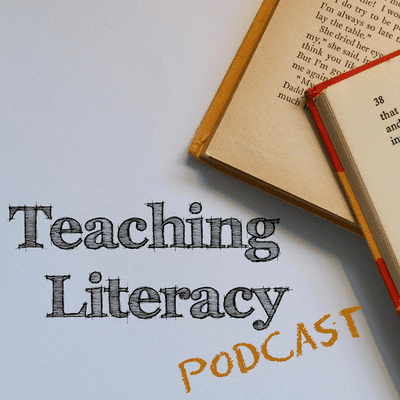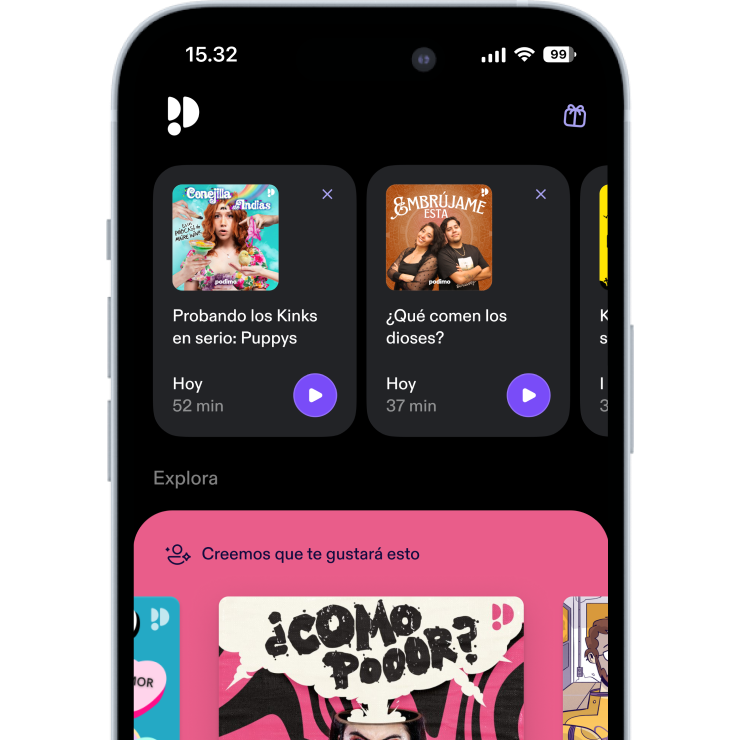
Teaching Literacy Podcast
Podcast de Jake Downs
Empieza 7 días de prueba
$99 / mes después de la prueba.Cancela cuando quieras.

Más de 1 millón de oyentes
Podimo te va a encantar, y no estás solo/a
Rated 4.7 in the App Store
Acerca de Teaching Literacy Podcast
Bridging literacy research and practice. Hosted by Jake Downs.
Todos los episodios
80 episodiosMelissa and Lori invited Jake to discuss Synchronous Paired Oral Reading Techniques (SPORT) — Listen to the episode here! Please write a short impact statement for Jake’s USU review packet (and thank you!): https://forms.gle/QcUs8ciMcAy2yG6L6 [https://forms.gle/QcUs8ciMcAy2yG6L6]
Please write a short impact statement for Jake’s USU review packet (and thank you!): https://forms.gle/QcUs8ciMcAy2yG6L6 [https://forms.gle/QcUs8ciMcAy2yG6L6] In this episode, host Jake Downs welcomes guest Dr. Freddy Hebert, a renowned literacy researcher, CEO/Founder of TextProject. The conversation covers topics such as the importance of automaticity, the core vocabulary, reading volume, and shifts in text complexity over the decades. They also dive into how teachers can better support students’ reading proficiency, particularly in early grades, and discuss actionable strategies for educators. The episode concludes with reflections on the current state and future of reading research and instruction. Link to TopicReads at TextProject: https://textproject.org/teachers/free-texts/topicreads-primary/ [https://textproject.org/teachers/free-texts/topicreads-primary/] Link to figures mentioned by Dr. Hiebert: https://drive.google.com/file/d/1m36jgp8Dt055UrdEa73IQAFES7PPemc_/view [https://drive.google.com/file/d/1m36jgp8Dt055UrdEa73IQAFES7PPemc_/view] Figure 1 shows the reading accuracy by percentile in grades 1-8. Figure 2 shows the ratio of rare words from core reading programs 1957-2014. Episode Overview 01:51 Welcome to the Teaching Literacy Podcast 02:28 Introduction to Reading Automaticity 03:36 Defining and Understanding Reading Automaticity 08:10 Core Vocabulary and Its Importance 11:28 Challenges with Rare Words and Proper Names 19:29 Implications for Teaching and Curriculum Design 31:00 Introduction to TextProject.org 31:21 The Importance of Reading Volume 32:19 Engaging Students with Texts 33:15 Statistical Learning and Vocabulary 39:56 Challenges in Reading Programs 46:15 Third Grade Reading Emphasis 48:58 Complexities of English Orthography 54:26 Optimism in Reading Research 56:29 Conclusion and Final Thoughts
Jake interviews Dr. Steve Graham of the Mary Lou Fulton College for Teaching and Learning Innovation at Arizona State University Please write a short impact statement for Jake’s USU review packet (and thank you!): https://forms.gle/QcUs8ciMcAy2yG6L6 [https://forms.gle/QcUs8ciMcAy2yG6L6]
Dr. Phil Capin joins the show to discuss 40 years of reading comprehension instruction. References: Capin, P., Dahl-Leonard, K., Hall, C., Yoon, N. Y., Cho, E., Chatzoglou, E., Reiley, S., Walker, M., Shanahan, E., Andress, T., & Vaughn, S. (2024). Reading Comprehension Instruction: Evaluating Our Progress Since Durkin’s Seminal Study. Scientific Studies of Reading, 1–30. https://doi.org/10.1080/10888438.2024.2418582 [https://doi.org/10.1080/10888438.2024.2418582] What Works Clearinghouse Practice Guides Mentioned by Dr. Capin Improving Adolescent Literacy: Effective Classroom and Intervention Practices: Kamil, M. L., Borman, G. D., Dole, J., Kral, C. C., Salinger, T., & Torgesen, J. (2008). Improving adolescent literacy: Effective classroom and intervention practices: A practice Guide (NCEE #2008-4027). National Center for Education Evaluation and Regional Assistance, Institute of Education Sciences, U.S. Department of Education. Available at https://ies.ed.gov/ncee/wwc/docs/practiceguide/adlit_pg_082608.pdf [https://ies.ed.gov/ncee/wwc/docs/practiceguide/adlit_pg_082608.pdf] Improving Reading Comprehension in Kindergarten Through 3rd Grade: Shanahan, T., Callison, K., Carriere, C., Duke, N. K., Pearson, P. D., Schatschneider, C., & Torgesen, J. (2010). Improving reading comprehension in kindergarten through 3rd grade: A practice guide. National Center for Education Evaluation and Regional Assistance, Institute of Education Sciences, U.S. Department of Education. Available at https://files.eric.ed.gov/fulltext/ED512029.pdf [https://files.eric.ed.gov/fulltext/ED512029.pdf] Foundational Skills to Support Reading for Understanding in Grades K–3: Foorman, B., Beyler, N., Borradaile, K., Coyne, M., Denton, C. A., Dimino, J., Furgeson, J., Hayes, L., Henke, J., Justice, L., Keating, B., Lewis, W., Sattar, S., Streke, A., Wagner, R., & Wissel, S. (2016). Foundational skills to support reading for understanding in kindergarten through 3rd grade (NCEE 2016-4008). National Center for Education Evaluation and Regional Assistance (NCEE), Institute of Education Sciences, U.S. Department of Education. Available at https://ies.ed.gov/ncee/wwc/Docs/practiceGuide/wwc_foundationalreading_040717.pdf [https://ies.ed.gov/ncee/wwc/Docs/practiceGuide/wwc_foundationalreading_040717.pdf] Providing Reading Interventions for Students in Grades 4–9: Vaughn, S., Gersten, R., Dimino, J., Taylor, M. J., Newman-Gonchar, R., Krowka, S., Kieffer, M. J., McKeown, M., Reed, D., Sanchez, M., St. Martin, K., Wexler, J., Morgan, S., Yañez, A., & Jayanthi, M. (2022). Providing reading interventions for students in grades 4–9 (WWC 2022007). National Center for Education Evaluation and Regional Assistance (NCEE), Institute of Education Sciences, U.S. Department of Education. Available at https://ies.ed.gov/ncee/WWC/Docs/PracticeGuide/WWC-practice-guide-reading-intervention-full-text.pdf [https://ies.ed.gov/ncee/WWC/Docs/PracticeGuide/WWC-practice-guide-reading-intervention-full-text.pdf]
Jake Downs talks with Dr. Blythe Anderson and Dr. John Strong about effective summer tutoring programs to prevent the summer slide in elementary reading. They discuss strategies such as small-group tutoring, differentiated instruction, and interactive read-alouds, based on multi-year research that shows significant gains in vocabulary, reading fluency, and foundational skills. The episode emphasizes the importance of data-driven decision-making and continuous improvement in summer programs, with implications for school-year instruction. 02:07 Understanding the Summer Slide 02:54 Research on Summer School Programs 07:00 Designing Effective Summer Tutoring Programs 08:46 Training and Implementation of Tutors 12:16 Session Format and Instructional Strategies 18:31 Assessment and Differentiation 27:21 Year Three Results and Findings 42:25 Program Evolution Over the Years 48:48 Big Lessons Learned from Summer School Programs 58:52 Final Thoughts and Optimism for Literacy Research

Rated 4.7 in the App Store
Empieza 7 días de prueba
$99 / mes después de la prueba.Cancela cuando quieras.
Podcasts exclusivos
Sin anuncios
Podcast gratuitos
Audiolibros
20 horas / mes























